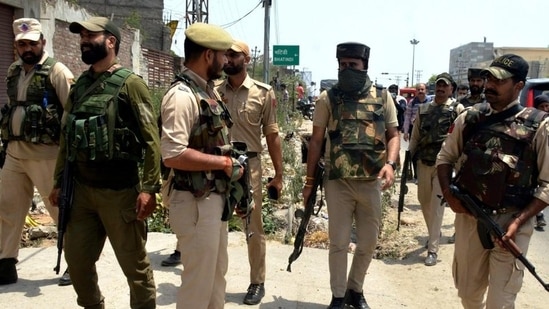J&K looks forward to ‘restoration of full democracy’, but concerns linger
For one month earlier this year, between April 19 and May 20, the Union territory of Jammu & Kashmir reacquainted itself with the fervour of a major election, voting across five parliamentary seats.
Three months after the general elections, where over 58% electorate turned out to vote, the region’s people will vote again across three phases in late September. (PTI file photo)
Political leaders crisscrossed the mountains of Kashmir and the plains in Jammu, drumming up support, addressing rallies of cheering crowds, even as the sceptre of violence faded through the campaign. It was an exercise that the region had rarely seen, having lost its statehood in August 2019, its administration passing into the hands of the Lieutenant Governor, on a day Article 370 was abrogated. Three months after the general elections, where over 58% electorate turned out to vote, the people of the region will vote again across three phases in late September. But this time, they will vote for issues closer home, and for their own legislators, for their own elected administration.
Khurshed Ahmad Bhat, a businessman from North Kashmir, said that assembly elections were the first beginnings of the restoration of democratic rights of citizens, and that he was enthused to vote. “Everything was snatched from us. The holding of assembly polls is very encouraging news and we will definitely vote as we want full democracy to be restored here,” he said.
In the bylanes of Srinagar’s old city, Jasim Ahmad who is a tour operator that the announcement was an encouraging continuation of wheels set in motion during the Lok Sabha elections. “Like our representatives have raised our issues in parliament, we hope that our local elected representatives in the assembly will attempt to solve our issues which have piled up for the past few years. Our economy is in distress, there is over-taxation, and there are problems in essential commodities like power, water and ration,” he said.
But even as there is enthusiasm, there are also corners of scepticism, largely centered around the question of statehood. Mohammad Ashraf Lone, a retired government employee based in Srinagar said, “Though elections to the assembly have been announced after a considerable delay, the main question is the restoration of statehood. If Delhi wants to end the general apathy among masses, it should give statehood back to the JK.”
In Jammu, there was similar enthusiasm for the assembly elections, but mixed with some trepidation, with the region the target of increased terror activities over the past year. In 2024 alone, 13 security personnel have been killed in terrorist attacks in Jammu, with senior police officers and security agencies admitting that between 50 and 60 terrorists have infiltrated into the region.
Sardar Balvinder Singh, an RTI activist based in Jammu, however, said that terror could not hold elections to ransom. “The situation is not that bad. Our government and security forces are capable. Terrorism has been weeded out of Kashmir but while stray incidents do take place, we can’t delay elections because of the. We want our statehood back and it is time that a popular government be put in place,” he said.
But Sumit Raina (50), a Jammu-based Kashmiri Pandit, who had to flee Kashmir with his family in the early 90s, said that the increased terrorist activity in Jammu had left him worried. “There is some uncertainty and fear among the people, especially in hilly and remote areas like Kishtwar and Doda. There is a chance of large scale violence, and this is a big challenge for the government. A popular elected administration is always better but the security scenario is a grave concern for me,” he said.
Images are for reference only.Images and contents gathered automatic from google or 3rd party sources.All rights on the images and contents are with their legal original owners.


Comments are closed, but trackbacks and pingbacks are open.